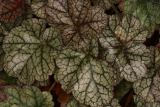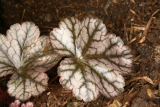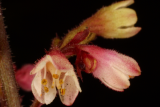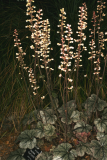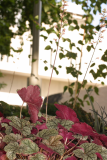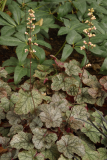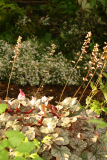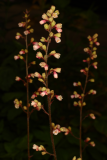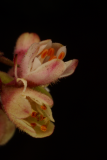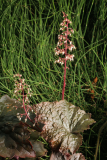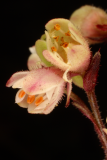Additional notes (click to expand)
Commemorative
These North American woodland plants, locally called Alum Root, are named after Johann Heinrich von Heucher (1677–1747), professor of botany and medicine at Wittenburg University (1709), Germany, and later in Dresden. Von Heucher was physician to King August II of Saxony. He was the founder of the botanic garden in Wittenburg and author of Novi proventus horti medici Academiae Vitembergensis (about the botanic garden) (1711). He was elected a fellow of the Royal Society in 1729. Most cultivars are derived from Heuchera americana
Oakeley, Dr. Henry. (2012). Doctors in the Medicinal Garden. Plants named after physicians. Royal College of Physicians.
link
Horticulture
We grow the Heuchera cultivars, Heuchera Plum Pudding’, Heuchera ‘Silver Scrolls’ and Heuchera ‘Velvet Night’. They are semi-evergreen, hardy perennials in the family Saxifragaceae. The genus originates from North America and Mexico. They have attractive marbled, silvery or mottled lobed leaves and delicate, bell-shaped flowers, which form an eye-catching ground cover
when planted en masse. We grow them in a raised bed of moist, free draining soil in partial shade. They do not like dry conditions so we water in dry spells and mulch with well-rotted manure in early
spring avoiding the crowns. When the foliage becomes untidy, it can be cut down and will soon be replaced by new growth. (Clare Beacham)
Oakeley, Dr. Henry. (2012). Doctors in the Medicinal Garden. Plants named after physicians. Royal College of Physicians.
link
Other use
Neither Austin (2004), Milspaugh (1974) or Moerman (2009) record any uses by the Native Americans, but Henrietta’s Herbal website, quoting King's American Dispensatory (1898), says it is used to check diarrhoea, haemorrhage, skin ulcers, and as a pessary for vaginal discharge.
Oakeley, Dr. Henry F. (2013). Wellcome Library notes.
link
Heuchera 'Silver Scrolls'
Family: SAXIFRAGACEAEGenus: Heuchera
Species:
Cultivar: 'Silver Scrolls'
Distribution summary: Garden Origin
Habit: Perennial
Hardiness: H5 - Hardy; cold winter
Garden status: Not currently grown
Reason for growing: Commemorative
